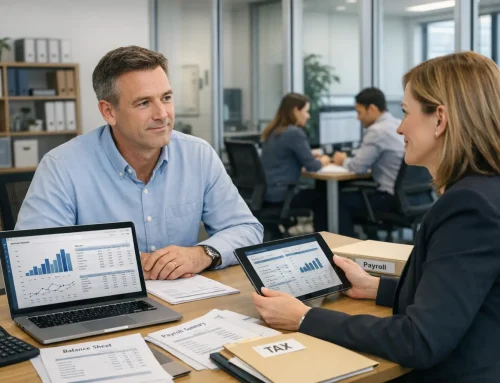Listen to our podcast for a comprehensive discussion:
When Transport Services Can Be Zero-Rated or Outside UK VAT
In the world of freight and logistics, understanding when to charge VAT and when not to is essential. Many UK transport businesses often ask:
-
“Do I charge VAT for transport to Europe?”
-
“What if I move goods within the UK, but the client is overseas?”
-
“When can I apply 0% VAT or no VAT at all?”
If you’re a UK haulage or transport company, getting this right means staying compliant and competitive. In this blog, we’ll explain the rules using simple English and practical examples.
Zero-Rated vs Outside the Scope of VAT
Before we get into examples, let’s explain two key terms:
-
Zero-rated means the supply is subject to VAT, but at 0%. You can still reclaim input VAT on costs.
-
Outside the scope means the supply doesn’t fall under UK VAT rules at all. There’s no VAT to charge or reclaim.
Both mean you don’t charge VAT, but they apply in very different situations.
When UK Transport Services Are Zero-Rated
Transport services can be zero-rated if they involve the movement of goods between the UK and a location outside the UK. This includes both exports and imports.
Example – UK to EU Exhibition Delivery and Return
Let’s say a UK company asks your haulage business to:
-
Deliver exhibition goods from London to a trade fair in Germany.
-
Collect the goods after the exhibition and return them to the UK.
This movement qualifies for zero-rated VAT because:
-
The transport crosses the UK border.
-
The customer belongs in the UK.
-
The movement relates directly to export and import of goods.
You would show VAT at 0% on your invoice and quote:
“Zero-rated under VAT Act 1994, Schedule 8, Group 8, Item 5.”
What Documents You Need
HMRC requires evidence that the transport is part of an international movement:
-
ATA Carnet (used for temporary exports, such as exhibitions).
-
CMR or Air Waybill proving the journey crossed into and out of the EU.
-
Booking confirmation from your customer.
Keep these records for at least 6 years. If HMRC checks your VAT return, they will ask to see these.
When Transport Is Outside the Scope of UK VAT
Now let’s consider a different case:
A company in France asks your UK haulage business to:
-
Pick up goods in Manchester.
-
Deliver them to Birmingham.
Although the journey is entirely within the UK, you still don’t charge VAT.
Why?
Because your customer is not based in the UK.
B2B General VAT Rule
For services between businesses, the VAT rules say:
“The place of supply is where the customer belongs.”
(VAT Act 1994, Section 7A; Notice 741A, para 6.3)
So if your customer is in France, the place of supply is France – not the UK. That means your service is outside the scope of UK VAT.
Example – EU Company Books UK-to-UK Delivery
You receive an email from a German company. They ask you to:
-
Collect office furniture in Leeds.
-
Deliver it to a business unit in Bristol.
Even though you never leave the UK, you do not charge VAT, because the invoice is addressed to a non-UK business.
On the invoice, write:
“Outside scope of UK VAT – reverse charge may apply.”
You must also quote the customer’s EU VAT number and keep evidence of the business relationship.
Key Differences Between Zero-Rated and Outside Scope

What Happens If You Get It Wrong?
Charging 20% VAT when none is due can:
-
Lose you the deal – foreign customers won’t pay extra UK VAT they can’t recover.
-
Create refund issues if they already paid you.
-
Lead to compliance errors and queries from HMRC.
Not charging VAT when you should, on the other hand, risks:
-
HMRC assessments for underpaid VAT.
-
Interest and penalties.
-
Loss of input tax recovery if you can’t prove your service was zero-rated.
That’s why proper invoicing and paperwork are key.
Other Transport Scenarios – What VAT to Charge
Scenario 1: Domestic Delivery for UK Customer
You move goods from Manchester to Glasgow for a UK customer.
✅ Charge 20% VAT – this is a standard-rated domestic supply.
Scenario 2: Cross-Border, But Customer Is Abroad
A Swiss company hires you to move goods from Birmingham to Paris.
❌ Don’t charge VAT – the supply is outside the scope of UK VAT.
Scenario 3: UK to EU Transport for UK Customer
You deliver machines from Reading to Rotterdam, then return them two weeks later.
✅ Charge 0% VAT – international transport qualifies for zero-rating.
Scenario 4: EU Company Moves UK Goods Within UK
A Dutch firm hires you to move goods from Liverpool to London.
❌ Don’t charge VAT – supply is outside scope.
Conclusion
UK transport companies must carefully assess each job to decide:
-
Is the customer based in the UK or overseas?
-
Do the goods move across UK borders or stay within the UK?
-
Is the transport directly linked to an export or import?
If the transport involves cross-border movement and the customer is UK-based, you can zero-rate the supply.
If the customer belongs outside the UK, even if the delivery is UK-only, the service is outside the scope of VAT.
Understanding these rules means:
✅ You charge VAT correctly.
✅ You avoid penalties.
✅ You stay competitive when quoting overseas clients.
For a deeper understanding of how VAT applies to different types of services, see our blog VAT on Services UK: A Detailed Guide.
📞 Written by etaxfiling.co.uk
Need expert advice on the VAT treatment of a transport contract? Contact us – your trusted UK VAT adviser with experience in the logistics sector.
To discuss how Accountants in Slough can assist you with your Accounts Preparation, please contact us for a free, no obligation consultation on: 0333 772 1616 or complete our Contact form and we will get back to you.




